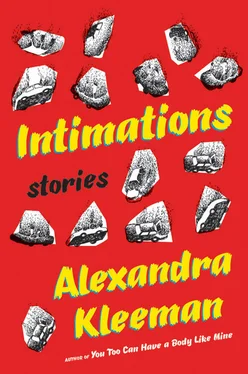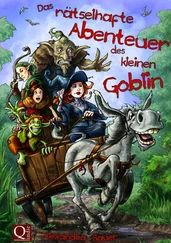I tried everything else before I tried rabbit, and that is to my credit, I think. I’ve tried to eat the walls (white plaster), the floor (white plaster), and the patches of Astroturf against which their tender shapes contrast so nicely. I tried to eat dust and dew, my own fingernails and hair. As little as there is, there is enough. There is enough, and also too little, a deficit that hangs here like an overhead light. It shows the inadequacy of myself to this room, of this room to myself, of the rabbits to each other as protection or company. Even the Astroturf seems to long for something more, though what it gets is more rabbits. The sky stretches empty overhead, and I devote time to wishing something into it, a cloud or a series of them, something to watch change and improve — or rather, just change.
This room has the look of a snapshot. It slides away day by day, though not for the rabbits, who seem to multiply mathematically rather than biologically, increasing their numbers even without nourishment. This is one of the things that leads me to say aloud, though of course there is no one to listen: Hunger is, in and of itself, an eye pointed continually at what is lacking and how badly.

What to feed this baby? I thought to myself. This produced no results, so I said it aloud. The baby rolled around vaguely, grabbing at its own nose, swaddled in a fair number of dishrags. It burbled in an incompetent way. I thought to myself: I am better than it, both at grabbing and articulating sounds. Then I wondered again about what to feed the baby.
The baby had been assigned to me by the government, or by a similarly well-organized group with a voice that sounded very much like that of the government. They called to tell me to come to the bus station to pick it up, and that I would have to bring my own container. They also said: clothes, bring clothes, it is not guaranteed that your baby will come clothed. My parents were disappointed in the extreme: I was only twenty years of age. “Twenty years old with a baby,” my father said, grudgingly crocheting a yellow beanie on the couch. “And with so much left unlived.”
Look at its teeth, I thought to myself. You can tell what anything eats if you look at its teeth. An archaeologist can look at a single tooth, even a fragment of a tooth, and find signs as to whether the tooth’s owner was an agriculturalist or a hunter-gatherer. Small cavities, or caries, on the surface of the tooth indicate that carbohydrates and sugars have dissolved on its surface. Similarly, chewing on tough seeds and husks leaves wear and tear on the crowns. I looked into the baby’s mouth. I was not sure it had teeth.
The baby threw up a small amount of orangish substance, which I took to mean it was full, or at least not empty, at which point I decided the question of feeding the baby could wait until I had watched a couple hours of television.

Skin and slaughter the rabbits, clean the rabbits with tools made of rabbit. Stow bits in larger bits of rabbit and try to tie the package up. Tidy up and sweep matter toward the other corner. Lie supine. Lie prostrate. Pick at the Astroturf with a fingernail. Is it held there with glue? Stack the rabbits. Number the rabbits. Place a fingertip on the nose and stroke from forehead over spine to the tip of its adorable puff. Regret and regroup. Enumerate the possibilities. Write messages to the sky. The most pliant and stationary of the rabbits, the rabbits most suited to lying still as if on a page, the sort of rabbits that seem somehow to understand that lying still may be a form of self-defense, the only form. Messages spelled out in white on the white surface are nearly illegible, but spelling them out offers a one-dimensional sort of relief, like speaking to yourself in a loud and confident voice.
The line between what is already food and what will not be is either rigid or soft. I know with certainty that it exists. In moments of extremity, it glows like a bar of neon light. Sometimes its bounds are decided by my body, stubborn, for example, in the coughing up of a milky paste of plaster and false grass. It leaves a lack inside like a knot that refuses to dissolve or digest, a knot lodged a bit too high in the chest, pressing against the lungs and heart as they try to push themselves out.
You can also live an entire life thinking something inedible until, one day, you find yourself gnawing on it, like a person still asleep.

Captain Robert Falcon Scott sat in a small sled hauled by dogs, headed for a far distal point. He was to travel from the shore at one end of Antarctica to the geographic South Pole, the point at which the earth’s axis of rotation meets its surface. He did this in order to become the first person to do so. It did not bother him that the earth wobbles, that the point toward which he was headed was not precise but rather a sort of consensus on where the center should be if the world were sturdy. It did not bother him that the other men complained bitterly and told each other that the number of dogs, provisions, and sleds would fail to suffice.
It did bother him, somewhat, that his was not the only party headed toward the pole, and that Amundsen’s crew was rumored to be both hardy and well-supplied. Scott’s men groaned.
“In a world in which the number of firsts available to mankind grows ever more paltry…,” Captain Robert Falcon Scott said to the crunch of ice and gasping of the dogs, the sound of air emptying from lungs, “the accomplishment of firstness is sufficient reward in and of itself…. We shall have salted pork for supper…. I am afraid the return journey is going to be dreadfully tiring and monotonous.”

Earlier on, the rabbits were tame. Later, it became clear where they stood in relation to myself, in our tiny food chain of only two links — theirs and mine. When I turned my back, the rabbits would become curious, move closer, encamp themselves in the crook of my knee or elbow. They scattered as soon as I looked at them directly, fleeing to the corners, where they piled seven or eight high, climbing one another, each trying to be the farthest from me. Our fear of each other was asymptotic: time eked out a flattening in how much we could care about killing or being killed, eating or being eaten, and this numbness was a way of understanding each other. We gave up in order to know more. And so I fell asleep and would wake beneath a cover of rabbits, eat rabbit while rabbits played around me, and care for them, keeping them clean and giving them names I would immediately forget.
Experts claim that starvation differs from hunger in several respects. As the stomach begins to atrophy, the phenomenal experience of hunger grows milder, less urgent, even as the chances for acquiring food to cure the nutritional deficit grow slim. “Some think a man will die sooner if he eats continually of fat-free meat than if he eats nothing, but this is a belief on which sufficient evidence for a decision has not been gathered,” wrote Canadian explorer Vilhjalmur Stefansson. In many ways, I am better suited to answer this question than anyone else, which makes me an expert in rabbit starvation. But as I become more knowledgeable, there is less I can say, shifting between a dizzying sense of freedom and a dizzying sense of sickness. In this way, starvation is not altogether unlike thinking, insofar as both processes leave the subject feeling less full, progressively, at all times.

Читать дальше













